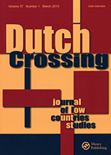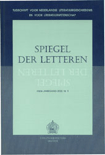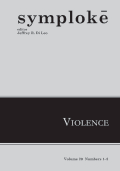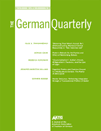
Kritika Kultura
Scope & Guideline
Illuminating the complexities of post-colonial narratives.
Introduction
Aims and Scopes
- Interdisciplinary Cultural Studies:
The journal emphasizes a broad spectrum of cultural studies, integrating perspectives from literature, sociology, and anthropology to explore how cultural narratives shape and reflect societal values. - Focus on Mobility and Migration:
Kritika Kultura frequently addresses themes of mobility, migration, and diaspora, examining how these phenomena influence identity formation and cultural expression in various contexts. - Engagement with Postcolonial Studies:
The journal contributes significantly to postcolonial discourse, investigating the legacies of colonialism and their impact on contemporary literature and cultural practices. - Exploration of Gender and Sexuality:
A core area of focus includes gender studies, particularly how literature and cultural narratives engage with issues of feminism, masculinity, and queer identities. - Environmental and Ecocritical Perspectives:
The journal increasingly addresses environmental issues through literary and cultural lenses, particularly in the context of climate change and its cultural implications. - Ethical Literary Criticism:
Kritika Kultura promotes ethical literary criticism, exploring the moral dimensions of literature and how narratives can influence ethical understanding and social justice.
Trending and Emerging
- Island Studies and Mobility Studies:
Recent publications highlight the intersection of island studies and mobility, exploring how geography influences narratives of identity and belonging in a globalized world. - Ecocriticism and Environmental Narratives:
A growing emphasis on ecocritical perspectives indicates an increasing concern for environmental issues, particularly in the context of literature that addresses climate change and ecological crises. - Digital Media and Cultural Production:
The journal is increasingly exploring themes related to digital media, fandom, and new forms of cultural production, reflecting the impact of technology on contemporary narrative forms. - Multispecies Narratives:
Emerging discussions on multispecies relationships in literature signify a new trend in understanding human-animal interactions and the ethical implications of these narratives. - Transnational Identities:
There is a rising focus on transnational identities and diasporic experiences, showcasing how migration shapes cultural narratives and individual identities in a global context.
Declining or Waning
- Traditional Nationalism:
Discussions centered on traditional nationalism appear to be declining, as the journal increasingly embraces themes of transnationalism and global interconnectedness. - Classical Literary Canon:
There is a noticeable decline in the emphasis on classical literary works and canon formation, as contemporary and marginalized voices gain prominence in the discourse. - Historical Narratives without Contemporary Relevance:
Papers focusing solely on historical narratives that lack contemporary relevance are appearing less frequently, indicating a shift towards more current and applicable cultural critiques. - Static Gender Roles:
The exploration of static and traditional gender roles in literature has waned, with a growing focus on fluidity and intersectionality in gender studies. - Eurocentric Perspectives:
There is a decline in Eurocentric literary analyses as the journal increasingly prioritizes diverse and indigenous perspectives in its publications.
Similar Journals

Contexto
Exploring contemporary issues through rigorous scholarship.Contexto is a premier academic journal published by UNIV ANDES, TACHIRA, dedicated to fostering cutting-edge research in the fields of social sciences and humanities. Since its establishment in 1994, Contexto has championed Open Access publishing, enabling researchers, professionals, and students worldwide to access a wealth of knowledge without barriers. With the ISSN 1315-9453 and E-ISSN 2610-7902, this journal serves as an essential platform for disseminating original research, critical reviews, and innovative discussions that address contemporary societal issues. Located in San Cristobal, Venezuela, the journal plays a pivotal role in contributing to academic discourse, encouraging interdisciplinary collaboration, and enhancing global academic visibility for authors and their work. Researchers seeking an influential venue for their contributions will find Contexto to be a valuable ally in advancing knowledge and understanding in an ever-evolving academic landscape.

Caietele Echinox
Cultivating a Global Conversation on Imagination and ArtCaietele Echinox is an esteemed open-access journal dedicated to the fields of literature, cultural studies, and imagination research, published by the University Babeș-Bolyai in Romania. Inaugurated in 2023 as an open-access platform, this journal strives to foster interdisciplinary dialogue and scholarly exploration, making its rich content accessible to a global audience. Housed within the Phantasma Center for Imagination Studies, Caietele Echinox aims to publish innovative research that examines the intersections of culture, imagination, and literature, thereby contributing to the broader understanding of human thought and artistic expression. With a commitment to high-quality scholarship, it invites contributions from researchers, professionals, and students, ensuring that vital discussions in these dynamic fields remain at the forefront of academic inquiry. By leveraging the latest in open-access publishing, Caietele Echinox stands as a crucial resource for those looking to engage with contemporary issues and themes in literary and cultural studies.

ENGLISH STUDIES IN AFRICA
Transforming Literary Understanding Across ContinentsENGLISH STUDIES IN AFRICA is a premier journal dedicated to advancing the field of literature and literary theory, published by Taylor & Francis Ltd, a leading name in academic publishing. With a focus on the intersection of English studies and African contexts, the journal has been a vital platform for over six decades, contributing to an enriched understanding of literary culture within the African diaspora from 1958 to 2024. While its impact factor is not explicitly listed, its Scopus rank of 146 out of 1106 journals in the category places it within the top 14% of its field, reflective of its significant scholarly contribution and rigorous peer-review process. As an essential resource for researchers, professionals, and students alike, ENGLISH STUDIES IN AFRICA fosters critical dialogue and interdisciplinary collaboration, making it a cornerstone for ongoing literary exploration and research in the region.

Knjizevna Smotra
Illuminating the Intersection of Culture and LiteratureKnjizevna Smotra, published by FILOZOFSKI FAKULTET in Croatia, is a prominent academic journal dedicated to the fields of Cultural Studies and Literature and Literary Theory. With an ISSN of 0455-0463 and an E-ISSN of 2459-6329, this journal has gained recognition for its commitment to advancing scholarly discourse and critical analysis in the humanities. Notably, it is positioned in the Q2 category for Cultural Studies and the Q1 category for Literature and Literary Theory as of 2023, indicating its significant impact in these disciplines. Despite its current Scopus rankings revealing challenges—such as its position in the 16th and 7th percentiles for literature and cultural studies respectively—Knjizevna Smotra continues to foster an intellectual environment for researchers, professionals, and students to explore and contribute to the ever-evolving landscape of literary criticism and cultural analysis. The journal's converged publication years from 2013 to 2024 signal its enduring relevance and commitment to disseminating impactful research in this dynamic field. Its address in Zagreb reflects its roots in a region rich in cultural and literary heritage, further enhancing its appeal to a global audience seeking to engage with diverse scholarly perspectives.

Novoe Literaturnoe Obozrenie
Exploring the Intersection of Culture and LiteratureNovoe Literaturnoe Obozrenie, an esteemed publication dedicated to the realms of Cultural Studies and Literature and Literary Theory, serves as a vital resource for scholars and professionals alike. Published by NOVOE LITERATURNOE OBOZRENIE-NEW LITERARY OBSERVER in the Russian Federation, this journal provides critical insights and scholarly critiques that reflect the evolving landscape of literary discourse. With an established H-index and a focus on fostering academic inquiry, the journal has secured its place amidst contemporary scholarly discussions, indexed in Scopus with rankings that illustrate its commitment to quality despite a current presence in the lower quartiles. Novoe Literaturnoe Obozrenie is a non-open-access journal, encouraging a traditional yet scholarly approach to literary studies and remains an essential read for researchers, students, and professionals that seek to deepen their understanding of literature’s impact on culture and society. Publishing from 2016 until 2024, it continues to bridge theoretical frameworks with practical discourse, making significant contributions to the fields it encompasses.

Dutch Crossing-Journal of Low Countries Studies
Unraveling Historical Threads of the Low CountriesDutch Crossing - Journal of Low Countries Studies is a prestigious peer-reviewed journal published by Routledge Journals, Taylor & Francis Ltd, specializing in the interdisciplinary study of the Low Countries, including cultural, historical, and socio-political perspectives. With an established ISSN of 0309-6564 and a digital counterpart E-ISSN 1759-7854, this journal serves as a vital platform for researchers and academics, enhancing the visibility of scholarly work in the fields of Arts and Humanities, Cultural Studies, and Sociology and Political Science. The journal has achieved notable rankings, including Q2 in Cultural Studies and Q3 in Arts and Humanities (Miscellaneous) for 2023, reflecting its impactful contributions and recognition among peers. Furthermore, it operates without Open Access, providing a selective academic discourse that encourages targeted readership while fostering high-quality scholarship. With a converged publishing period from 2011 to 2024, Dutch Crossing continues to be an essential resource for anyone engaged in the study of the cultural and societal dynamics of the Low Countries.

SPIEGEL DER LETTEREN
Unveiling the Rich Tapestry of Literary DiscourseWelcome to SPIEGEL DER LETTEREN, a distinguished journal published by PEETERS in Belgium, with an impressive Q1 ranking in Literature and Literary Theory. Since its inception in 1996, this journal has been at the forefront of literary scholarship, engaging researchers, professionals, and students in profound discussions and analysis of literary texts, theories, and cultural contexts. Although it does not currently offer open access, its rigorous editorial standards ensure that each published work contributes significantly to the field, promoting the advancement of knowledge and understanding in literature. With an established reputation, SPIEGEL DER LETTEREN serves as a vital resource for those seeking to explore the nuances of literary studies, supported by a diverse range of articles that reflect both contemporary and historical perspectives.

JOURNAL OF MODERN LITERATURE
Connecting Literature and Culture in the Modern EraJOURNAL OF MODERN LITERATURE, published by Indiana University Press, is a distinguished peer-reviewed journal that delves into critical examinations of modern literary texts and theories. Since its inception, the journal has served as a vital platform for scholars dedicated to the exploration of contemporary literature, making significant contributions to the discourse within the field. With an impressive ranking of Q2 in the Literature and Literary Theory category as of 2023, it positions itself among the top-tier journals in its domain, reflecting its strong impact within academic circles. This journal not only fosters scholarly dialogue but also embraces innovative approaches to literary criticism, ensuring relevance in today’s dynamic cultural landscape. Researchers, professionals, and students will find a rich repository of articles that engage with various modern literary paradigms, enhancing their understanding and appreciation of the intricate relationships between literature and broader socio-cultural contexts. Though it does not operate under an open access model, the journal's extensive reach through its digital ISSN (1529-1464) and print ISSN (0022-281X) allows for valuable insights to be disseminated to the appropriate audiences.

Symploke
Exploring the Intersections of ThoughtSymploke, published by University of Nebraska Press, is a leading interdisciplinary journal in the fields of literary and cultural studies that aims to foster dialogues across a diverse range of scholarly perspectives. With its ISSN 1069-0697 and E-ISSN 1534-0627, the journal is committed to publishing high-quality research that examines the intersections of literature, philosophy, and social theory. As a prominent platform for innovative scholarship, Symploke plays a crucial role in advancing critical discourse, making it an essential resource for researchers, professionals, and students alike. The journal provides unrestricted access to its valuable content, thereby ensuring the dissemination of knowledge without barriers. With an emphasis on in-depth analyses and theoretical contributions, Symploke continually seeks to expand the horizons of contemporary thought and offers a vital forum for voices within the academic community.

GERMAN QUARTERLY
Fostering Dialogue in Literature and Performing ArtsGERMAN QUARTERLY, published by Wiley, is a distinguished academic journal that serves as a vital platform for scholarly discourse in the fields of Cultural Studies, Literature and Literary Theory, and Visual Arts and Performing Arts. With an ISSN of 0016-8831 and an E-ISSN of 1756-1183, this journal is committed to exploring the complexities of German literature and culture from a multi-faceted perspective. It stands out in its categories, ranking Q3 in Cultural Studies and Q2 in both Literature and Literary Theory and Visual Arts and Performing Arts, as of 2023. Its Scopus ranking highlights its relevance and contribution to ongoing dialogues within the arts and humanities, making it an essential read for researchers and professionals alike. Although not an open-access journal, GERMAN QUARTERLY maintains a rigorous peer-review process, ensuring that published works meet the highest standards of academic quality. With converged contributions from 2002 to 2024, it continues to provide valuable insights and foster a deeper understanding of German heritage and its impact on contemporary culture. The journal is an indispensable resource for students and researchers seeking to broaden their knowledge and engage with the latest scholarship in these vital areas of study.